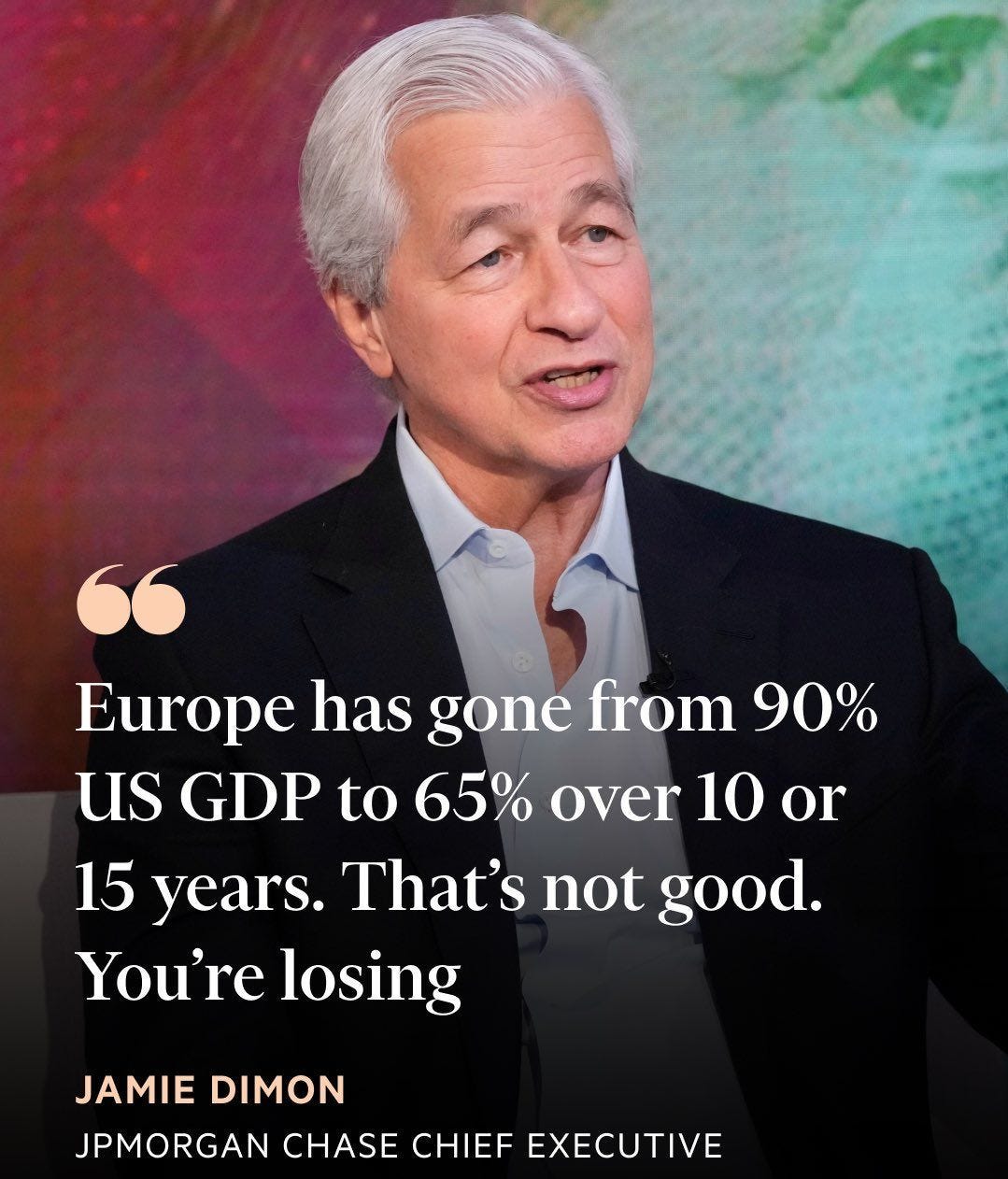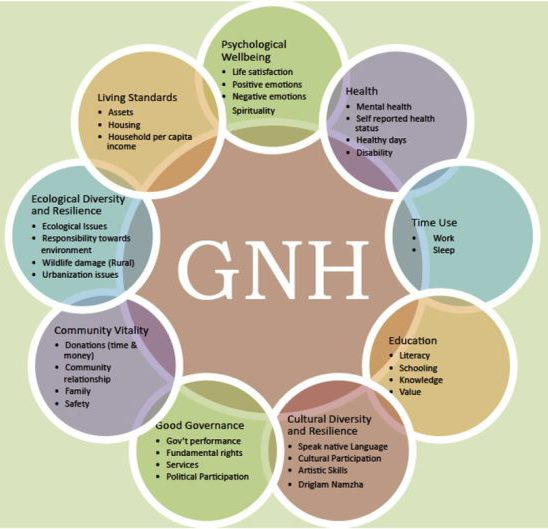Is Money The ONLY Measure of Success? (Hint - NO!)
Jamie Dimon claims Europe's GDP is lagging behind the #1 country for incarcerations, drug deaths and homelessness!
Jamie Dimon, suspected lizard person and verified CEO of JP Morgan Chase, was on a trip to Ireland earlier this month where he gave a speech to the Department of Foreign Affairs. In it he claimed that Europe was "losing" because its GDP has fallen from 90% of US GDP to 65% over the last 10 or 15 years and as we all know the ONLY measure of how a region and its people are doing is GDP, right?
GDP = Grossly Distorted Picture
I was first alerted to this story by my friend, and journalist, Teymoor Nabili whose immediate reaction was to point out what a poor picture of success GDP is and then reel off these other stats that Mr. Dimon conveniently ignored:
According to the UN Human Development index, 7 out of the top 10 countries in the world are in Europe. The US does not appear in the top 10.
According to the United Nations Population Division, 8 of the top 20 countries in the world with the longest life expectancy are in Europe. The US is at number 48.
In the PISA global education rankings, 7 European countries score higher than the US, which is ranked just 18th in the world. (The top 5 are all in Asia.)
According to the OECD, when it comes to: Work life balance – 25 European countries rank higher than the US.
Safety - 24 European countries rank higher than the US.
Subjective well-being - 11 European countries rank higher than the US.
Knowledge and skills - 15 European countries rank higher than the US.
And according to the Numbeo Quality of Life Index, 9 out of the top 10 countries in the world are in Europe. The US does not appear in the top 10.
Thanks for that Teymoor, I’ll take it from here…
As of the most recent data in 2023, the United States ranks 54th globally in infant mortality and is ranked 33rd out of 38 countries in the OECD.
The United States ranks approximately 20th globally in its civilian gun death rate, beaten by several countries in South America and the Caribbean but none in Europe.
The United States currently ranks first in the world for total prison population, with around 1.8 million people incarcerated as of early 2025 - significantly more than any other country, including China and Brazil.
The United States currently ranks first globally for drug overdose deaths, having the highest rate of overdose fatalities in the world.
The United States currently ranks #1 for homelessness in the developed world with over 770,000 people on the streets at a rate of 2.3 per 1,000 inhabitants.
Etc, etc, ad nauseum.
The US paints itself as a bastion of freedom, the shining city on the hill but it is as smothered by its own propaganda as North Korea - did you know American television tends not to show Olympic sports that it doesn't win at?
My point is that not only is GDP an appalling measure of success for any nation but that it is chosen by people like Dimon precisely because it obscures all the other statistics that prove the US is run for shareholders as opposed to citizens (who do you think benefits from the high drug deaths and incarceration rates? Companies like Purdue Pharma, Johnson & Johnson, AmerisourceBergen, Cardinal Health, McKesson, Core Civic, The GEO Group, I could go on.)
What’s a better measure of success?
Although GDP is of course linked to happiness and wellbeing it is not solely responsible and surely the purpose of work and money and all these other conventions we literally made up over millennia are to make us happier and healthier, not simply richer, right? Well, the Bhutanese worked this out a long time ago and I think they’re on to something.
Bhutan is a landlocked nation in the Eastern Himalayas bordered by China and India. It’s a democratic constitutional monarchy, much like the UK, with a King as head of state and a Prime Minister as head of government. The Je Khenpo is the head of the state religion, Vajrayana Buddhism, which is one of the reasons that Bhutan, in the 1970s, decided to recognise the value of national happiness over national income and adopted the goal of Gross National Happiness over Gross National Product. But how exactly do you measure Gross National Happiness?

How do you measure happiness?
Every few years Bhutan surveys about 10% of it’s population and compiles statistics that cover 33 indicators under nine “domains”, below. To avoid the issue of subjectivity, none of the 33 indicators measure happiness directly (although the psychological well-being survey does ask questions about life satisfaction that come close to a definition of happiness).
For each of the 33 indicators, there is a cut-off for determining whether an individual has reached a sufficient level. For example, sleep sufficiency is set at eight hours per day. A person is deemed happy if they achieve sufficiency in at least six of the nine domains. This individual-level information is then transformed into a single measure for the population: the Gross National Happiness Index. The index ranges from 0 (if no one has achieved any of the domains) to 1 (if everyone has achieved sufficiency in at at least six domains).
The Gross National Happiness Index provides an alternative approach to measuring the success of a nation, and addresses several shortcomings of GDP. For example, GDP will always rise with industrial production but if that production takes a toll on the local environment Gross National Happiness may fall because it include people’s experience of their natural surroundings. Also, while GDP values only market labour, Gross National Happiness takes other uses of time into account. Crucially, unpaid work factors into the calculation of total time spent on work, which determines whether an individual has sufficient leisure time. Given the disproportionate burden of domestic work on women, this makes the Gross National Happiness Index more gender-sensitive than GDP.
A key difference between Gross National Happiness and GDP is that Gross National Happiness has a maximum value whereas GDP can (or must) grow without limit. Once all citizens pass the income sufficiency threshold (which was set at 1.5 times the national poverty line), additional income does not raise Bhutan’s Gross National Happiness Index, and resources would be better used to invest in other domains rather than continuing to raise income.
Is happiness measurable outside of Bhutan?
Gross National Happiness strikes me as a much more useful and sustainable measure of success for a country to strive for in 2025 and the UN agrees. In 2012 it launched the first World Happiness Report on what it declared the first World Happiness Day, March 20th, which I think should be a public holiday in all nations and will certainly be on my calendar next year.
The report is not compiled in quite the same way as Bhutan’s - the UN combines wellbeing data from over 140 countries with analysis by researchers from across academia - and the infamous ranking of happiest countries is based on a single, question derived from the Cantril Self-Anchoring Striving Scale (Cantril Ladder):
Please imagine a ladder with steps numbered from 0 at the bottom to 10 at the top. The top of the ladder represents the best possible life for you and the bottom of the ladder represents the worst possible life for you. On which step of the ladder would you say you personally feel you stand at this time?
However, at least they have provided an alternative measure of national success that we can aspire to instead of how much more money we can put into the pockets of Jamie Dimon and his pals!
To Do List
My recommendations for new things to read, watch, look at, listen to and do this week:
Something I have suspected, and Yanis Varoufakis has articulated, for years is the fact they we are moving from the democratic nation state to the feudal corporate state and, in this shocking article, Futurism agrees and explains why: Tech Billionaires Accused of Quietly Working to Implement "Corporate Dictatorship"
I have only just discovered Love Aid Singapore, a charity founded by Gilbert Goh that is - as we speak - building out polyclinics and delivering food to the wounded and starving in Gaza. They only have an Instagram page but the videos are extraordinary and hopeful amongst an endless scroll of misery. Singaporeans can donate via Pay Now to 87745281.
And finally, we lost Ozzy this week, which definitely hit me. He may have been known as the Prince of Darkness but he was actually a light in the dark for many; a troubled but mischievous soul who brought joy to millions. This duet with Elton John recorded in 2020 is a fitting tribute to his extraordinary life.
Right, that’ll do ya! Nx





